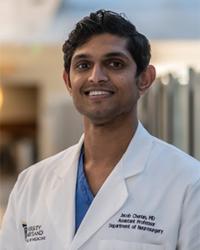
Jacob Cherian, MD
Skull Base Surgery, Endovascular Neurosurgery
Assistant Professor of Neurosurgery

Languages: English
Gender: Male
Locations
UMM Neurosurgery UM Medical Center
22 South Greene StreetSuite S-12-D
Baltimore, MD 21201 Get Directions
PH: 410-328-6034
FAX: 410-328-0756
PH: 410-328-6034
FAX: 410-328-0756
PH: 410-328-6080
FAX: 410-328-6993
About Me
A neurosurgeon, Dr. Cherian specializes in endovascular neurosurgery and cerebrovascular/skull base surgery. Among the conditions he treats are:
- Brain aneurysms, arteriovenous malformations, arteriovenous fistulas
- Carotid stenosis
- Cavernous malformations
- Meningiomas, acoustic neuromas
- Moyamoya disease
- Open microsurgery for skull base tumors
- Spine vascular malformations
- Subarachnoid and intracranial hemorrhage
- Trigeminal neuralgia, hemifacial spasm, glossopharyngeal neuralgia
- Vertebrobasilar ectasia
Dr. Cherian always puts the patient first, seeing them as a real person and not just a medical image. He makes changing patients' lives for the better his main priority. He takes the time to understand the patient’s symptoms and diagnosis and guides them to appropriate treatment plans factoring in their personal preferences.
At University of Maryland Medical Center, Dr. Cherian is part of a comprehensive team comprising a wide range of brain and spine disease specialists. They treat complex nervous system problems using modern equipment and with the specialized expertise needed for microsurgery, radiosurgery and endovascular techniques.
Dr. Cherian is trained in both microsurgical neurosurgery and interventional neuroradiology techniques. He works with his interventional neuroradiology and neurosurgery colleagues to form a comprehensive neurovascular intervention team. Microsurgery allows Dr. Cherian and his team to safely treat many issues of the skull, including skull base tumors and neurovascular pain syndromes. He can offer the full range of treatment options for complex brain and spine blood vessel problems — such as aneurysms, AVMs, fistulas and carotid disease — from both outside and inside the artery.
Dr. Cherian chose to practice neurosurgery because the specialty represents the most courageous and noble traditions of the medical profession — it is challenging, there is always a need for innovation and it helps people in life-threatening situations. He makes sure each patient understands what they are facing so they can make informed decisions; through this approach, he seeks to lessen the anxiety often caused by neurosurgical problems.
Research
Dr. Cherian is actively exploring new clinical devices and techniques to use in vascular and intracranial neurosurgery.
His notable prior works include:
- Cherian J, Srinivasan V, Froehler MT, et al. Flow Diversion for Treatment of Intracranial Aneurysms in Pediatric Patients: Multicenter Case Series. Neurosurgery. Sept 2019
- Cherian J, Dabagh M, Srinivasan V, et al. Balloon-Mounted Stents for Treatment of Refractory Flow Diverting Device Wall Malapposition. Oper Neurosurg. Oct 2019
- Cherian J, Madaelil TP, Tong F, et al. Combined reconstructive and deconstructive endovascular approach for bilateral vertebral artery dissection with subarachnoid hemorrhage. Neurosurg Focus. Jan 2019
- Cherian J, Srinivasan V, Kan P, et al. Double-Barrel STA-MCA Bypass: Can it be considered "High-Flow"? Oper Neurosurg. Aug 2017.
- Cherian J, Atmar R, Gopinath S. Shunting in Cryptococcal Meningitis. J Neurosurg. Oct 2015.
- Cherian J, Fridley J, Duckworth E. A Modern Paradigm for Peritoneal Catheter Insertion: Single Port Optical Access Laparoscopic Shunt Insertion. Neurosurgery. Jun 2015.
Awards
- Kinjiro Iwata Award for Excellence and Leadership in Neurosurgery (2018)
Memberships
- Congress of Neurological Surgeons (since 2011)
- American Academy of Neurological Surgeons (since 2011)
